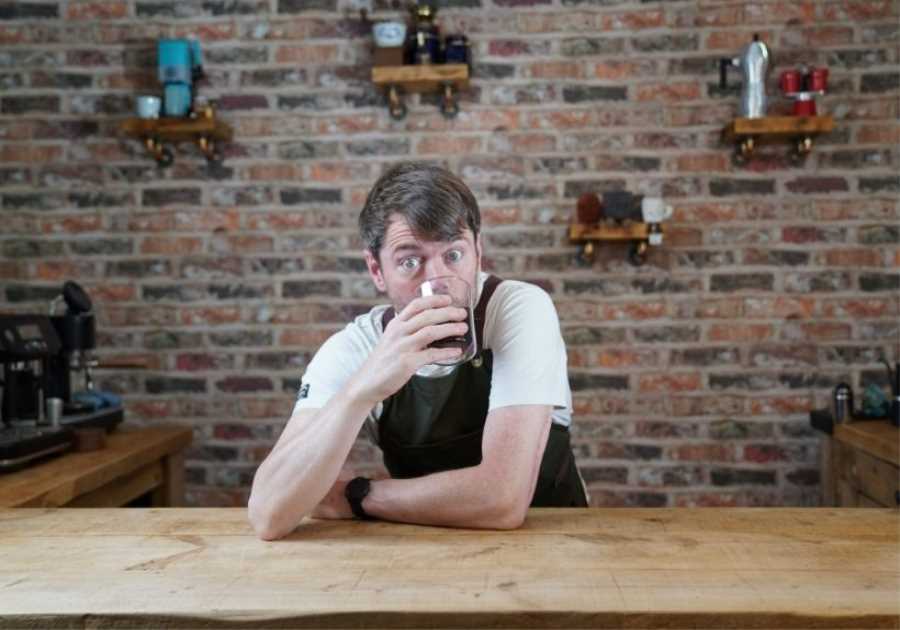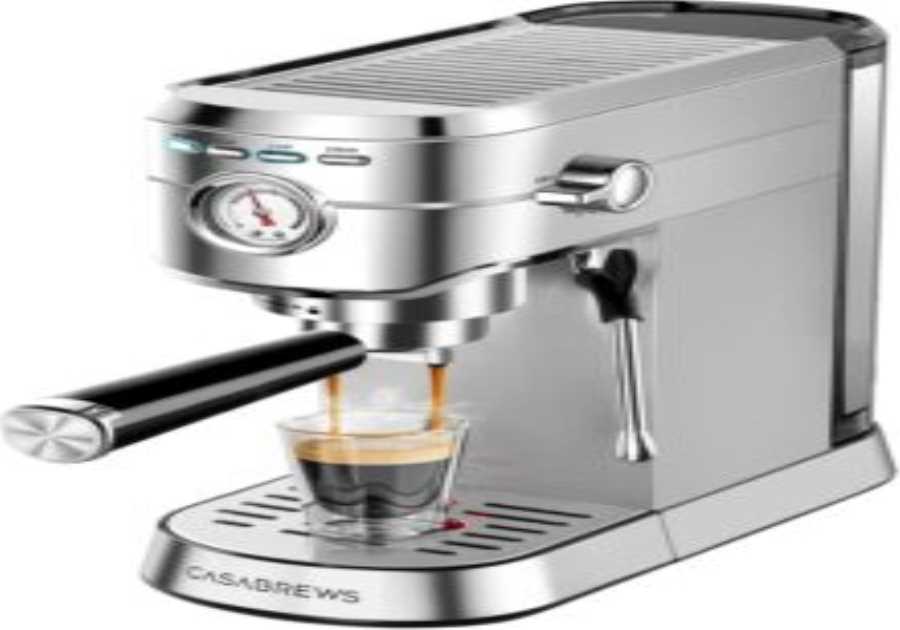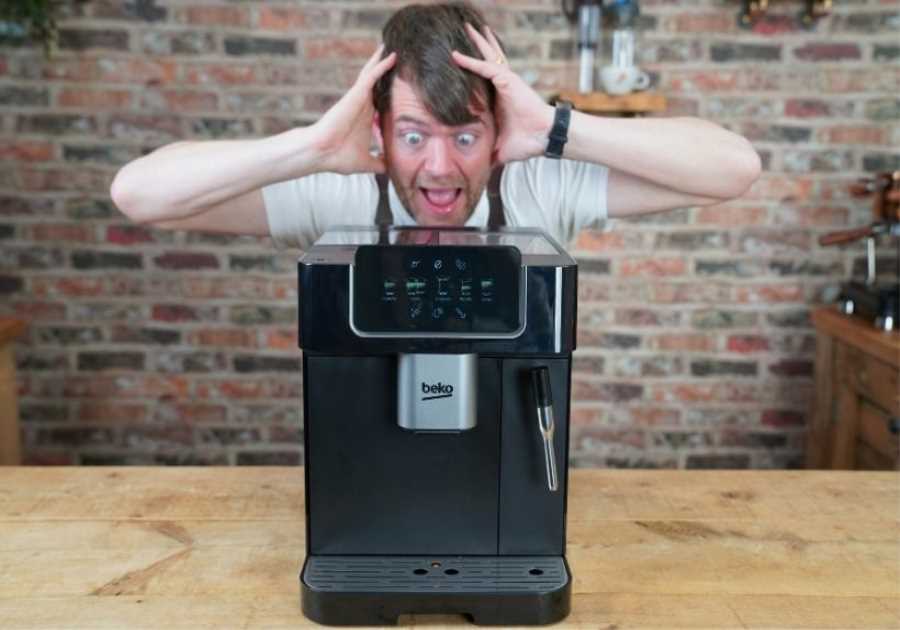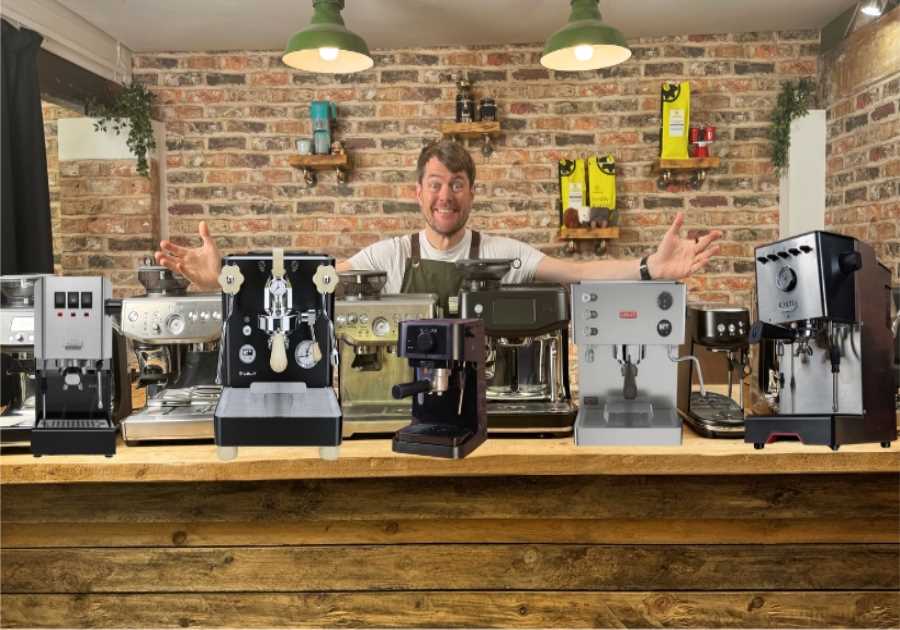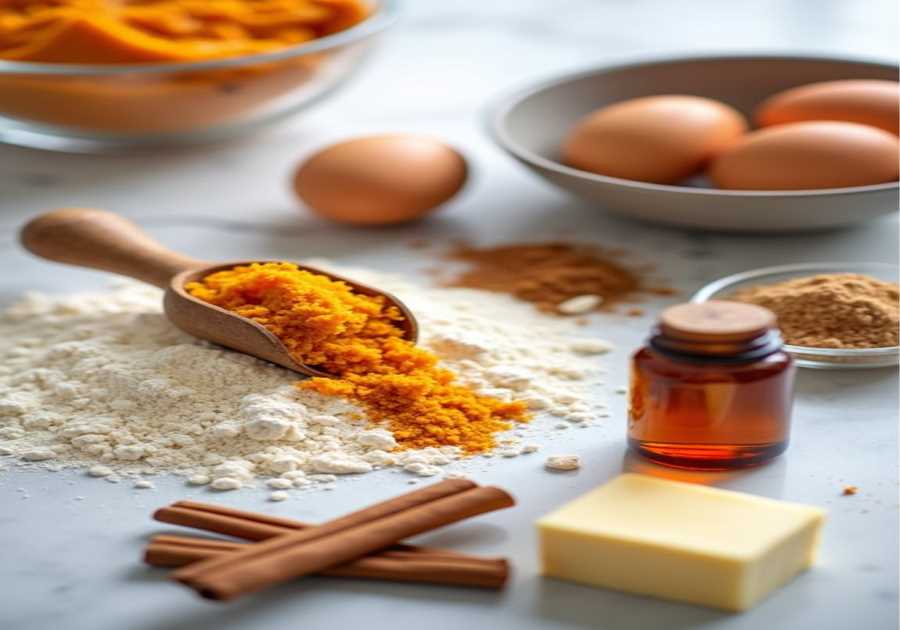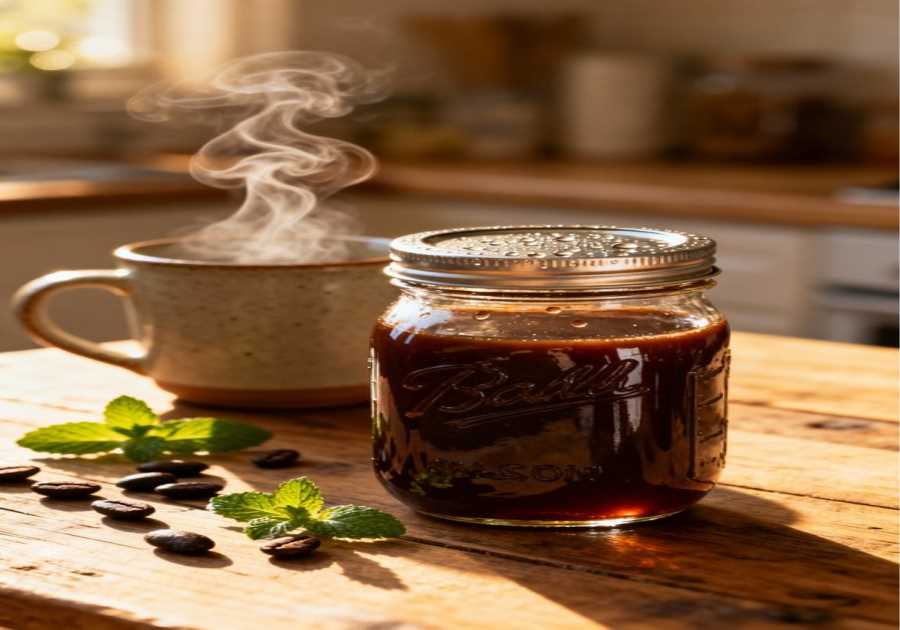You love coffee, I know that – or you wouldn't be here ;-), but this doesn't necessarily mean that you love caffeine, or maybe you do but your body doesn't? Whatever the case, you're clearly on a mission to discover the best decaf coffee, and this is a mission I'm hopeful I can help you with.
Some people just don't get decaf, and I can understand that.
Many people drink coffee for the boost it gives, so it's no accident that coffee is usually regarded as a morning drink, with many people – myself included – not knowing how they'd get through the day if it didn't start with coffee.
But regardless of why we started out drinking coffee, the reason most of us continue to drink it has more to do with taste and ritual than it does purely with caffeine delivery.
Surely if it was just about the caffeine, you could buy a caffeine supplement, or drink a can of that flipping disgusting energy drink that apparently gives you wings.
By the way – that stuff doesn't give you wings. I drank about 6 of them once, mixed with vodka. Couldn't stand, let alone fly.
What's the big deal with caffeine anyway?
Caffeine, as you're no doubt aware, is a natural chemical, a drug that acts as a stimulant.
People tend to associate caffeine with waking up, feeling alert, pushing through tough shifts at work or staying awake while “burning the midnight oil” studying for exams, for example.
But the big deal with caffeine is that when all said and done, it's a drug. It does things to your body when you consume it, all sorts of things. See how caffeine affects your body.
There are positives, of course, but there can be too much of a good thing.
Consuming too much of it can cause negative consequences, including sleeplessness, agitation & anxiety, and how much is too much depends on the individual.
I tend to drink three or four coffees per day these days. That figure has reduced, actually, since blogging about coffee became my full-time gig. When I was “working” for a living (I still can't bring myself to call this work, it's far too much fun) I'd usually need coffee to wake up.
Now that I'm doing what I love doing, I find that I don't need that same kick to motivate me to wake up, and I've discovered that if I have my first coffee a bit later in the day, somewhere between 10am and 11am, it appears to have a bigger impact.
I don't drink coffee beyond about 3 pm, and I find that by doing this I never have issues sleeping. I'm usually asleep not long after my head hits the pillow, but occasionally in the past that hasn't happened, and I just lie there wondering what the heck is going on. I don't know for sure that this is down to caffeine, but since sticking to this routine I've rarely had trouble entering the land of nod.
Coffee isn't just about caffeine
I get the impression that some people think decaf coffee isn't real coffee, somehow, but I think anyone who thinks this is probably forgetting (or maybe never discovered) that caffeine is just one of a huge number of natural compounds found in coffee.
Yes, caffeine is naturally found in coffee, but it's just one of over a thousand naturally occurring compounds in coffee. See: list of chemical compounds in coffee. So does a reduction in the amount of just one of over a thousand compounds stop it from being coffee? Does it heck, it just makes it coffee with less caffeine.
In my humble opinion, the vast majority of the goodness we get from coffee is still present in the best decaf. I say in the best decaf, because this is coffee which has been decaffeinated in a particular way, which I'll get to shortly.
So why buy decaf?
This is a very simple one – so you can drink more coffee :-).
Remember, decaf isn't any less of a coffee than full caffeine, it's only the caffeine that is significantly reduced, all of the other great things we get from coffee, including the taste, are still present – at least with the kinds of decaf I'm referring to as the best.
If you're pregnant, (congratulations) then you'll probably be avoiding caffeine for that reason – but if you're a coffee lover, you'll still want your daily coffee, so decaf is the answer.
You may be swerving caffeine for other medical reasons, or it may simply be that you've discovered that if you drink full caffeine coffee as late into the day as you'd like, you have trouble sleeping, so you want to switch to decaf after a certain time of day.
A quick shameless plug
If you're at this point, and you're just thinking “just tell me what Decaf to try” – well, OK, I'll quickly tell you about my own Decaf ;-).
I sell high quality, freshly roasted coffee beans at The Coffeeworks. I currently only have one decaf, but I absolutely love the stuff! I'll tell you more about it when I get to the best decaf coffee suggestions, but if you just wanted to grab a bag – here you go and don't forget to copy the discount code.
Use discount code CBNC25 for 25% off your first order at Coffeeworks
Decaf shouldn't be called decaf
A quick point I wanted to make before telling you which decafs I think are among the best, is that I don't think decaf should even be known as decaf.
Decaffeinated coffee, sounds like it's coffee with the caffeine removed, but it isn't – as you're probably aware. Decaffeinated means it's had the caffeine reduced, not removed.
I say “as you're probably aware” as I know many people are, but not everyone. I've spoken to people in the past who were shocked to find that decaf doesn't mean caffeine-free, and even more shocked to find that the data they found about how much of the caffeine has been removed, isn't necessarily correct, which I'll get to shortly.
How is coffee decaffeinated?
Caffeine is present naturally in all coffee beans and it needs to be removed whilst the beans are in their raw “green” state before they are roasted and turned into the golden or dark brown coffee beans we are all used to.
As I'll talk about later on (in the FAQ section) the decaffeination process removes a lot of the caffeine, but not all of it, so if you absolutely can't take any caffeine at all, for whatever reason, then you'd be best steering clear. However, if you're looking for the great taste and other benefits of coffee without the same amount of caffeine, then decaf is a great option.
Decaffeination was originally done with chemical solvents – and is still done with chemicals to this day for some decaf coffees, which is why I'm referring to certain types of decaf as the best, as we'll get to in a sec.
The first decaf coffee was made using Benzene, exposure to which the World Health Organization refers to as “A Major Public Health Concern” – and although the use of Benzene was stopped, decaffeination is still being done with chemicals in many cases, but there are also now natural chemical-free decaffeination processes.
These processes are, mainly, water decaffeination and CO2 decaffeination. I say “mainly” as there's a third process that I think deserves to be mentioned.
When it comes to water decaffeination, this is known as the Swiss Water decaffeination process – although you'll often see it called “mountain water decaffeination, which I think is simply due to the Swiss Water decaf process being trademarked, so you'll see decafs coming from Colombia as “Colombian Mountain Water Processed” and from Mexico being called “Mexican Mountain Water Processed” – and as far as I'm aware, it's basically the same thing.
This method uses fresh water in which green coffee beans are immersed in order to charge the water with the compounds of the coffee.
This “flavour charged” water, which is usually referred to as green coffee extract, is then used as the solvent with which to remove the caffeine, and because it contains the same flavour compounds as the beans, these flavour compounds aren't leached into the water but remain in the coffee beans, so it's only caffeine being removed.
CO2 decaffeination is another process designed only to remove caffeine and not flavour, but it does so with liquid CO2 instead of green coffee extract. The green coffee beans are immersed in water in a chamber into which liquid Carbon dioxide is forced under pressure, taking out the caffeine. This process is thought to be among the best for preserving coffee's precious compounds, and like the Swiss Water process, targets only caffeine.
There is one other decaffeination process that appears to work well for removing only caffeine, called the sugar cane process, also known as NEA.
Whether this is a chemical fee decaf process or not appears to be a bone of contention though. Some call it a chemical process due to the use of Ethyl Acetate, while others argue that this is naturally derived from sugarcane, and therefore refer to it as a chemical-free process.
This process works by sugar cane being fermented into molasses, in order to create Ethanol, which is used to make Ethyl Acetate, which is then combined with natural spring water and used in order to decaffeinate the coffee beans, and then the coffee beans are steamed to remove the Ethyl Acetate.
One of the coffees I'm referring to as among the best decaf coffees below (I'll make that clear) is processed in this way.
The best decaf coffee is ground at home
The other key thing to mention with decaf coffee is that you’ll get the best flavour from your coffee if you buy whole coffee beans and grind them yourself with a coffee grinder just before brewing.
Yeah, pre-ground is easier, but it's not the best – if it was, why don't coffee shops do that? Why would they invest in expensive commercial coffee grinders if they could just buy them pre-ground?
The simple reason is – freshness.
When you grind a coffee bean, you break it into many, many pieces, and a great deal more of the coffee is then exposed to the air. Yes, sealing pre-ground in air-tight bags will make a difference, but it doesn't completely stop coffee from deteriorating in flavour.
When you buy my coffee from The Coffeeworks (remember, use the discount code CBNC25 for 25% off your first order) and you choose pre-ground, we grind it to order as we're bagging it up, so this will be fresher than when you're picking up a bag of pre-ground from a supermarket.
But, still, in my humble opinion coffee is always best when it's freshly brewed using freshly ground coffee.
Coffee grinders aren't all that expensive, either, especially if you're brewing with manual brewers or with a low cost espresso machine with pressurized baskets. See:
One other thing to mention is that if you're using a bean to cup coffee machine and you're wondering about the best way to deal with decaf beans with these, I've recently made a video specifically on this topic:
So with that said, I'll now offer some suggestions when it comes to the best decaf coffees in the UK.
Caramelised Biscuit & Gingerbread Single Origin Decaf Colombia
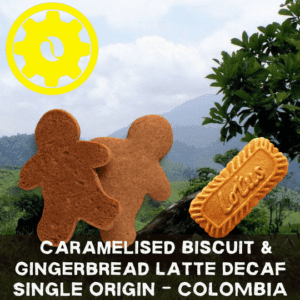
Use Discount Code CBNC25 For 25% Off Your First Order
I know, I've mentioned my own decaf already, and it may seem very biased of me to put my own coffee here ;-), but in my humble opinion, this coffee deserves to be included in this post as it's one of the best decaf coffees I've ever tasted.
It's not for everyone, I admit that – but if you have a look at the reviews, while it's not everyone's cup of tea ;-), it's impressed a lot of people. Some people have described it as among the best decaf they've tried, while there are some who found it a bit too powerful, and strangely one or two who said the opposite. Just goes to show that everyone has different tastes.
Also, while some people have told me they absolutely love this black, others have told me they can't stand it black ;-), but they absolutely love it as flat white or cappuccino, and again it's a case of each to their own, but this coffee does take on a completely different flavour when mixed with milk.
I find that as neat espresso, filter, Aeropress, Americano, etc., it's a strong flavour, mainly with notes of caramelised biscuit (think Lotus biscuits), but when mixed with milk, the sweetness of the milk turns this into a gingerbread flavour, for me.
Actually, I've not tried drinking it black with sugar to see if the sweetness of sugar does a similar thing, and putting sugar in coffee isn't the most natural thing for me to do – in fact, I don't think I've done this since I was about 16 ;-). I will give this a try though.
Pact Coffee – Decaf El Tambo
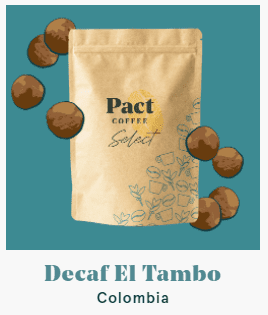
This is the coffee I mentioned earlier when talking about the sugar cane decaffeination process, which is the way this coffee from Pact Coffee is decaffeinated. Just keep in mind that Pact Coffee do change their coffee seasonally, so when you get to their Decaf page from the link above you may find a different decaf.
Pact Coffee refers to “Milk Chocolate Truffles” as the main flavour note, along with a caramel sweetness and caramel acidity. I don't know about you, but they had me at milk chocolate truffles ;-).
By the way, when it comes to pact coffee – as you'll probably know, they're most well known for their coffee subscriptions. Just keep in mind that if you are considering a subscription, pact offers a number of different deals to my fellow coffee botherers (coffeeblog readers):
Kickback Coffee – Caff Ya Later
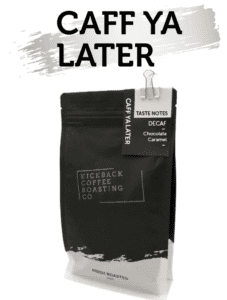
Another Colombian, this Decaf coffee from Kickback Coffee is from Huila and Cauca, the varietals are Castillo, Caturra and Colombia, it's grown at 1,600 – 1,850m, washed processed & then decaffeinated via the sugarcane process.
I've just gone through a bag of this decaf, and I can tell you it's very nice!
I was making a number of shots with the Sage Oracle & the Sage Oracle touch as Sage Appliances sent them to me to review, and I didn't want to bounce off the walls, so I used Kickback's Caff Ya Later. I drank it as espresso, Americano, and flat white, and I found it very enjoyable for all three.
Another thing I particularly enjoyed, was opening the bag ;-), I know, very sad – but I've never had a coffee pouch that opened in such a satisfying way. The tear line has a very neat perforation so it doesn't rip or stretch, you end up with a perfectly straight top when you've opened it.
This is another example of a great quality freshly roasted decaf that I wouldn't have known was decaf if I wasn't told.
Union Roasted Coffee – Whole Coffee Beans – Decaf – 1kg
Union are a very well-known coffee roaster. I appreciate that they're one of the bigger roasters out there, and many people prefer to support smaller roasters, which is great, and something I do too (I buy coffee beans from a heck of a lot of places, I don't only drink my own). But if you're looking for a good price on a high quality coffee that has been decaffeinated, I think this is a good one to look at.
I say a good price on a high quality coffee that has been decaffeinated, to clarify that it was a decent quality coffee to begin with. This is a high scoring (84) coffee, a blend of coffees from family-owned coffee farms in Rwanda and Peru.
It comes with a roasted on date, as you'd expect with speciality coffee – and not just a sell by date, which you'd expect on a bag of coffee from a supermarket.
So I think this looks very good for the price, given that it's literally just three quid or so more than another coffee selling very well on Amazon which is also water decaffeinated but doesn't have an SCA score or a roasted on date.
Decadent Decaf Signature Espresso Coffee Beans
Decadent Decaf is a firm that's been championing the Swiss Water decaf process in the UK for a while now. In fact, I'm fairly sure the first decaf of this kind that I tried, and possibly one of the first decaf coffees I experienced which I wouldn't have known was decaf without being told, was from DD – not long after starting coffeeblog in 2015.
I'm including this mainly because I can't think of decaf without thinking of Decadent Decaf, they've worked hard promoting the fact that Decaf doesn't have to taste dire, and it's clear from the Amazon Reviews, that most people have been very impressed with this coffee.
I have to admit that I don't like the lack of information on DD's coffees, I'd prefer more.
I'd prefer to know a lot more about the coffee, the origins, the varietals, and so on than they give, as they tend to focus mainly on the quality of the decaf process than the beans – but having said that, I can't argue with the reviews.
Lavazza Decaffeinated Medium Roast Coffee Beans, 500g
I know that some are going to pull their face at the fact I've included Lavazza coffee beans in this post, as although they're a very well known coffee brand, they're really “second wave” along with brands like Starbucks and Costa, they're not the kind of beans that would usually be discussed on a blog focused on speciality coffee.
But I am including these coffee beans for a few reasons.
Firstly, Lavazza is a very well known brand – and while they may not be a brand that you'd find in a third wave coffee shop – the vast majority of the population drink coffee in second chain coffee shops. In fact, many people reading this paragraph right now will be wondering what the heck I'm going on about with “waves” ;-), which is kind of my point.
If you're really into the speciality coffee thing, then you may have developed your palate to the point that a coffee many people will enjoy, won't be particularly enjoyable to you.
If you don't consider yourself a speciality coffee connoisseur, and if you regularly drink “mainstream” coffee, from chains like Costa & Starbucks, and other more “normal” cafes, the chances are, you'll like these kind of coffee beans.
Secondly, given that these coffee beans are coming from a well known brand, and bigger brands usually have the ability to charge more for their goods due to the perceived value of a known brand, they're very good value at this price for half a kilo.
Finally, the reviews. Even if your coffee palate is way too developed to even consider buying commodity coffee, you surely can't disagree that a product with well in excess of ten thousand reviews, is a popular decaf?
Pact Coffee – Decaf Asomuprisma

Another one from pact coffee, this one is decaffeinated using the CO2 process I mentioned earlier, and it's another Colombian Decaf.
This coffee is grown by Asomuprisma Women's Association, a group of 22 women who run their own coffee farms. The varietals used are Castillo and Colombia, it's grown at an altitude of 1770m, it's a washed processed coffee, and the decaf process as I've just mentioned is CO2.
This one according to pact has taste notes of dark chocolate and candied fruits. It's worth pointing out here if you're new to speciality coffee, and coffee tasting, that these aren't flavourings, they're flavour notes that are determined usually at the cupping stage, when the roaster is tasting the coffee for the first time.
So just keep in mind that these flavours are going to be relatively subtle, depending on your palate. When we call a coffee “sweet” for example, it doesn't mean sweet as if it's been sweetened with sugar, and when someone says it has dark chocolate flavour, this isn't going to be as obvious as it would be if it were flavoured, it'll usually be quite subtle.
I've seen negative reviews in the past for coffee beans that illustrate how people misunderstand flavour notes.
The most obvious one was one where someone had given a coffee (not one of mine, thankfully) an awful review score and a scathing review about nearly poisoning one of their family members as it contained Almonds and their family member had an allergy. The coffee in question didn't contain actual Almonds, this was just one of the flavour notes, meaning it's what the person doing the tasting thought it was reminiscent of.
Kev's Decaf Coffee FAQ
How much caffeine is in full-caffeine coffee beans?
They're not actually beans, did you know that? They're seeds, of the coffee plant, but they're not beans, as they don't belong to the particular family of plants that would make them beans, but they look like beans, which is why we call them coffee beans.
By the way, did you know that it's quite possible to roast your own coffee beans (seeds) at home, these days? While there have been home roasters available for quite some time, which are smaller and less expensive than commercial roasters, they've usually required a lot more knowledge and skill to operate than most of us would possess or would be prepared to take the time to develop.
There are now a couple of amazing home roasters which literally just slot into your kitchen and which you can use to roast small batches of your own coffee, by pressing a button on your phone!
For more on this see:
How much caffeine is in a cup of coffee, depends. It depends on the type of coffee being used, the brew process, and how much ground coffee is used to make the cup of coffee.
This is one of the reasons it's so difficult to understand how much caffeine you're consuming when it comes to instant coffee, and in particular, the most popular brands of cheapest instant coffee. This is simply because this kind of instant coffee is usually made with a blend of Arabica and Robusta, and Robusta contains roughly double the caffeine that Arabica does.
Instant brands don't usually tell you what % of robusta is in their instant, and they don't tell you exactly how much caffeine is present either, not really. In my great caffeine conspiracy post, I shared how I'd been getting in touch with the biggest instant coffee brands, trying to get them to clarify the caffeine content in their instants. The replies I received were a bit odd.
Firstly, they all tend to like to talk about “per cup”, and I was pushing them on this based on the fact that there's no standard cup size, and actually the cup size has nothing to do with it… If I load up a 300ml cup with a shovel full of instant and make another coffee in the same cup but with a heaped teaspoon, they're both a cup of coffee, right?
Secondly, the amount of caffeine per cup one brand replied with, was a bit scary – until it turned out that they told me “grams” when they meant to say milligrams ;-).
Also, one of the replies I had from one of the brands (I'm not saying who, as I'd rather not get sued) indicated that they actually couldn't tell me what percentage of Robusta vs Arabica was in their instant blend, because they didn't know how much of each there was in one batch to the next. This is odd because if they don't know the percentage of Arabica to Robusta in each batch, they'll never be able to get close to knowing how much caffeine each cup or spoon or jar of instant contains.
But talking about freshly brewed coffee, it's actually a very difficult question to answer, and if you have a quick search you'll find lots of contradictory answers.
I think a good rule of thumb if you're drinking manually brewed coffee (filter coffee, cafetiere, Aeropress) is that a 300ml (10 fluid ounce) cup of 100% Arabica, is likely to contain around 120mg of caffeine. This is around the normal “builder's mug” type volume.
A double espresso is usually going to contain somewhere around 80-120mg of caffeine, but this will depend on whether the coffee being used is 100% Arabica, or an Arabica/Robusta blend, and if so, what the % is. So if you need to be on the safe side just over-egg it a bit and assume a double espresso is about 150mg of caffeine, for example.
So, an Americano made with a double shot, will contain the same amount of caffeine, as there's no caffeine in water of course unless you're using some really weird water ;-). The same with flat white, cappuccino, latte, etc., – as these are simply made by mixing espresso with steamed milk.
How much caffeine is in decaf?
I don't think anyone actually knows!
If we look at the law surrounding the use of the word “decaffeinated” – it depends on which country you're in, which is why I mentioned earlier that the data you find when you're trying to figure out how much caffeine is in decaf, may be incorrect.
In the USA, the rule on decaf is that to be labeled as decaf, there must be a reduction in caffeine of at least 97%.
So this doesn't tell you how much caffeine decaf coffee can contain, it tells you how much of it has to be removed in order to be labeled as decaffeinated.
With the European rule that we're currently still following in the UK, at the time of writing, the amount of caffeine can be no more than 0.1% for beans or 0.3% for instant coffee.
This only tells you the way the rules are different in different countries, though – it doesn't tell you anything about how much caffeine is actually in your cup of decaf, and the information I've found on this on the web, is really quite bizarre.
If you spend some time researching this, most articles will tell you that a cup of filter coffee made from decaf coffee beans contains around 0.25mg – 1.9mg of caffeine per fluid ounce.
This is a massive range, and if we go in the middle with about 0.8mg per fluid ounce, this would mean our 300ml cup contains about 8mg of caffeine. OK, but… how can this be correct if decaf can contain 0.1% caffeine?
A 300ml cup of filter coffee is going to be made with around 15-18 grams (15,000mg – 18,000mg) of coffee beans, so if we say 16.5 grams – one gram is 1000 milligrams, so 0.1% of 16,500mg is 16.5mg? Are the people who're working this out drinking water with a hint of coffee? ;-).
It gets even more strange when you try to figure out how much caffeine instant coffee has.
At the moment, numerous websites including Holland & Barrett, (and I'm assuming this is because others have copied H&B without checking the info…) are stating that there is no difference in caffeine content between a cup of instant, full caffeine coffee and a cup of instant decaffeinated coffee.
This is what H&B and others are currently stating re the amount of caffeine:
“Instant coffee (8oz/237ml) contains 27 to 173mg of caffeine. Decaffeinated instant coffee (8oz/237ml) contains 27 to 173mg of caffeine.”
Really??
So – I give up. All I can tell you for sure is that according to the rules we're currently following in the UK, decaf beans should have no more than 0.1% caffeine content, and decaf instant (coffee extract) should have no more than 0.3%.
Is full caffeine coffee the main cause of sleep disruption?
It's important to remember that caffeine is in a wide number of other products, not just coffee. It's not just the other obvious foods and drinks, either.
The only time I know of where I'm fairly certain that caffeine has caused problems with me getting to sleep wasn't caffeine that I'd consumed via food or drink. I couldn't figure out why I was struggling to drift off, until the next morning – when I looked at the box of paracetamol that I'd taken not long before going to bed.
It wasn't just paracetamol, it was some “extra” brand that had mixed caffeine and paracetamol, so I'd ended up taking the equivalent of about three shots of espresso.
Can decaf coffee keep you awake?
The simple answer to this is, probably not. Although it's difficult to find out exactly how much caffeine is in a cup of coffee in terms of mg, it is greatly reduced, and the amount it's reduced to I would think would probably be small enough to not impact on sleep in terms of the caffeine content.
I say “in terms of caffeine content” – because I do wonder whether there's more to sleep disruption than purely a chemical thing.
For example, if you associate coffee with the morning & waking up, and then you drink it at night, if you're not used to drinking it at night could it somehow make you more alert and less sleepy than a drink you might actually associate with bedtime like hot chocolate? Not sure, this would be something worth testing. I know I always tend to feel tired when I drink hot chocolate, and I'm assuming that's because I used to drink it at bedtime as a kid, and some part of my brain is still 6 years old ;-).
Is decaf better for you than regular coffee?
Personally, I think it's probably the case that enough still isn't known about all the compounds within coffee other than caffeine, to know whether or not caffeine is the only compound in it that has a positive or negative impact on the health of a particular individual.
Decaf coffee should, if it's one of the natural decaf processes I'm referring to, hopefully only have the caffeine removed, and all the other compounds (many of which are associated with the flavour we get from coffee) should be as intact as possible. So to say decaf is better for your health, I think is a very sweeping statement. I'd say it may be a better choice for someone who needs to reduce caffeine intake.
Regarding the plethora of other compounds in coffee, these are usually associated with a boat load of health benefits of coffee, but as I say, I really don't think it's that simple and I think we're all different, so I think it's very complex. For example, what if there's a particular compound within coffee other than caffeine that a particular person has an intolerance to? In that case, a coffee that would be better for this individual's health would be a coffee which has had that compound reduced, but in reality, the only thing you'll ever find being reduced, and the only thing most people think of when they think of coffee, is caffeine.
Life is like a box of chocolates, so join my Brew Time list, subscribe to my YouTube Channel, become an accredited coffee botherer (Patreon supporter), try my coffee at The Coffeeworks (use discount code coffeebotherers), follow me on Twitter & Instagram, follow the coffeeblog FaceBook page, and that’s all I have to say about that.
The post The Best Decaf Coffees for 2022 & Kev’s Decaf FAQ. appeared first on Coffee Blog.
By: KevTitle: The Best Decaf Coffees for 2022 & Kev’s Decaf FAQ.
Sourced From: coffeeblog.co.uk/best-decaf-coffee/
Published Date: Wed, 05 Jan 2022 18:11:35 +0000
Did you miss our previous article...
https://coffeecutie.com/decaf/the-best-decaf-coffees-for-2022-amp-kevs-decaf-faq







